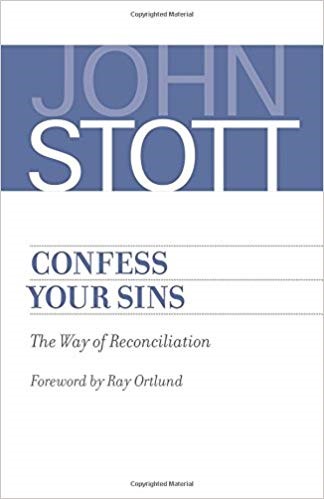I recently picked up (and read) a new book (actually a new reprint of an old one), written by John Stott on the reality of sin and the necessity of confession. “Confess Your Sins: The Way of Reconciliation” was written originally in 1964, and reprinted in 2017.
One of the greatest snares to which Christians are exposed in the contemporary world is the tendency to grow accustomed to sin. It is not just that sin is ingrained in our nature, or that the devil refuses to leave us alone, but that the influences of “the world,” the pressures of a godless, secular society, are so insidious. Wherever we look, sin stares us in the face. The standards of the press, radio, television, and advertisements are, to say the least, sub-Christian. We cannot escape this continuous assault upon us. It is frighteningly easy to become morally insensitive, and to find that we are no longer hurt or grieved or shocked by the evil with which we are surrounded.
One of the surest antidotes to this process of moral hardening is the disciplined practice of uncovering our sins of thought and outlook, as well as of word and deed, and the repentant forsaking of them. It is not enough to confess them, asking for forgiveness and cleansing; we need deliberately, definitely, specifically to forsake them. We would not be so plagued by “besetting sins” if we did this. It is important, when we bring our sins into the open before God, not to stop there, but to go on to adopt a right attitude towards both God and the sin itself. First, we confess the sin, humbling ourselves with a contrite heart before God. Secondly, we forsake it, rejecting and repudiating it. This is a vital part of what is meant by “mortification” in the New Testament. It is taking up towards sin an attitude of resolute antagonism. uncovering of sin is in itself of little value; it must lead us to an attitude both of humility towards God and of hostility towards sin. “Let those who love the LORD hate evil,” or “the LORD loves those who hate evil” (RSV) (Ps 97:10); and it is this holy hatred of evil which is promoted by the faithful, systematic uncovering and confession of our sins.
Shortly after, I read this by Anne Steele on the reality of God’s forgiveness of our confessed sin.
How oft, alas, this wretched heart
Has wandered from the Lord,
How oft my roving thoughts depart,
Forgetful of his word!Yet sovereign mercy calls, “Return!”
Dear Lord, and may I come?
My vile ingratitude I mourn;
O take the wanderer home.And canst thou, wilt thou yet forgive,
And bid my crimes remove?
And shall a pardoned rebel live,
To speak thy wondrous love?Almighty grace, thy healing power
How glorious, how divine!
That can to life and bliss restore
So vile a heart as mine!Thy pardoning love, so free, so sweet,
Dear Saviour, I adore;
O keep me at thy sacred feet,
And let me rove no more.


